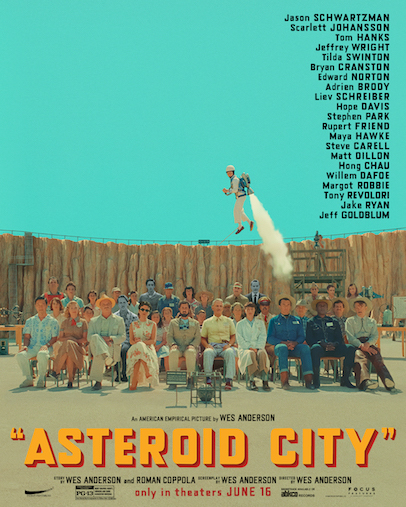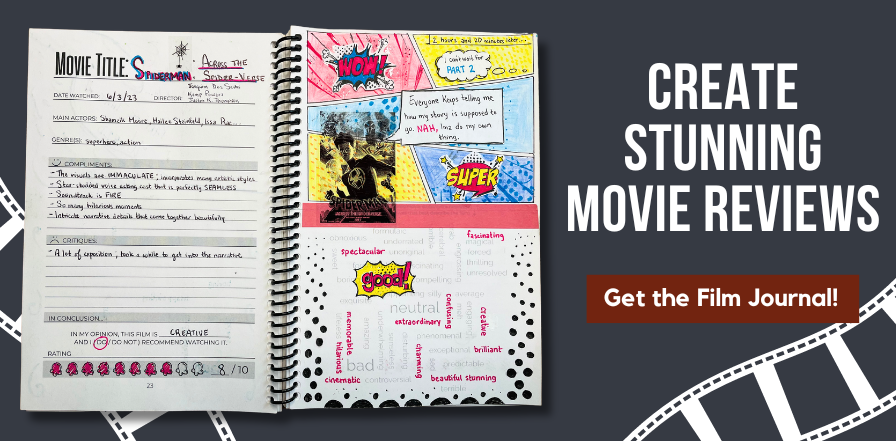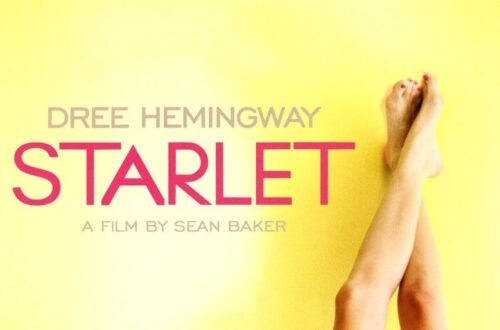Asteroid City Analysis | The 2nd Watch Is Better & More Meaningful
Asteroid City is a film that requires two viewings to really start appreciating what it’s trying to say.
After the first viewing, it seems as though Asteroid City clearly values style over substance:
Its delicious peach and mint pastel color palette, contrasted with serious, vintage black and white scenes.
The overstuffed use of prestigious actors as the director displays the kind of pull he has in the film industry.
The script that reads as though the characters are saying a lot yet nothing at the same time.
At first, Asteroid City feels like Wes Anderson’s, the film’s director, long-winded way of saying, “Look at all the cool things I can do.”
But upon viewing it a second time, with a general understanding of the film’s style and plot journey, you see that the beginning of the movie always had the end in mind.
This Asteroid City analysis will dig deeper into figuring out what this movie means or rather if it was meant to mean anything at all.
Asteroid City Analysis

Asteroid City is a play within a play within a documentary about the making of a stage production of a fictional world called Asteroid City. Within Asteroid City, strange events occur during a Junior Stargazer convention.
Discovering Meaning
The biggest theme within this movie is the existential search for meaning.
Rather than answer questions about the meaning of life, Asteroid City poses the questions itself, sometimes with answers that may or may not be.
From the film’s beginning, we see the actor who plays Augie (Jason Schwartzman) ask the scriptwriter, “Why does Augie [his character] burn his hand on the Quickie Gridle?”
Now, this line makes absolutely no sense the first time you watch the movie. I don’t think I even registered it the first time. But this question foreshadows the palm-searing moment that we see near the film’s end.
The scriptwriter doesn’t have an answer for Augie.
This implies that sometimes, there is no reason for things to happen the way they do.
Does there always need to be a reason?
There’s another kid in Asteroid City, a brainiac in town for the Junior Stargazer Convention who has a habit of asking those around him to dare him to do something dangerous.
Finally fed up, his father asks, “What’s the cause? What’s the meaning? Why do you always have to dare something?”
Amidst stark silence, the kid responds, “I don’t know. Maybe it’s because I’m afraid otherwise, nobody’ll notice my existence in the universe.”
Whew. Deep.
That line does hit quite hard with those of us who are ambitious, who feel this incessant desire to “make it” without being quite sure where that line ends.
It brings up the question, what does life mean if no tangible impact is made?
In other words, if a tree falls in the forest with no one around, does it even make a sound?
Is life meaningful in and of itself or must meaning be dared?
Augie’s son Woodrow (Jake Ryan), shaken by the presence of the alien that appears mid-film, begins to ask, “What’s out there? Something? The meaning of life? Maybe there is one.”
To which his grandfather (Tom Hanks) responds, “I hope you’re still Episcopalian.”
This brings us to how the film roped religion into the discussion of finding meaning.
Augie is an atheist but claims his children to be Episcopalian at the beginning of the movie. By the end of the movie, Woodrow makes it known that he’s no longer Episcopalian, he’s atheist as well.
In their search for meaning, the answers within religion seem insufficient for the amount of questions that arose during their trip to Asteroid City.
Is there a God?
When the alien decides to appear in Asteroid City a second time, everyone’s existential fears heighten even further into a state of pure chaos.
At this point, Woodrow decides to project his love for his newfound girlfriend whom he connected with at this Stargazer Conference onto the moon.
He decides that his girlfriend is his world and his meaning and that’s all he needs to know for now.
God may not exist for him but his love for his girlfriend does.
We finally get to the point in the film where Augie burns his hand on the Quickie Griddle.
Overwhelmed with confusion about his character’s actions, the actor who plays Augie goes to the director and urgently asks him, “Am I doing it right?… I still don’t understand the play.”
The director says, “Doesn’t matter. Just keep telling the story. You’re doing him right.”
We don’t always know the why. And we don’t need to.
This climatic moment in the film communicates that amid uncertainty, even swimming in a sea of meaninglessness, it’s important to keep moving forward. Even if you don’t know the why.
The Alien
When the alien first appears on screen it is jarring, quite confusing, and very unexpected if you know nothing of the plot’s trajectory.
The alien’s presence really jump-starts a lot of the characters’ more frantic search for meaning in a universe that’s even wider and more mysterious than they initially imagined.
This silly creature with wide, circular eyes, skinny long limbs, and a surprisingly photogenic stance held such a non-threatening presence in Asteroid City.
Its casual approach to this asteroid that is the center of Asteroid City’s relevance makes the people rethink their importance.
It makes them question what is important.
There’s this pressing feeling that the alien knows something that the humans don’t know.
Later on in the film, we meet the actor behind the alien. When he’s asked what the alien means he says,
“I don’t play him as an alien, I play him as a metaphor.”
“A metaphor for what?” they respond.
“I don’t know. We don’t pin it down.”
This leaves viewers thinking, “Is there a hidden meaning that we’re missing? Or is the point that we don’t know the meaning but we don’t have to know the meaning?”
Perhaps we are meant to let go of the need to understand everything. Perhaps there is nothing to understand.
Grief
Other analyses of Asteroid City have mentioned the weight of grief in this film as well but I would argue that grief is not one of the film’s primary focuses.
Rather, the presence of death further magnifies the significance of life which puts the film’s characters in a mental space to really evaluate what their life truly means in that moment.
Throughout the film, you don’t really see Augie’s family grieve the loss of their mother the way that most human beings would grieve the loss of a loved one.
They remain very stoic, almost unaffected by the fact that they don’t have a mother or a wife anymore.
At the end of the film, the character who plays Augie comes face to face with the character who would have played the mother if she still had a scene within the play.
They talk about the deleted scenes that would have included the deceased mother and how, in the end, all that was left of the mother was a picture.
And Augie’s pictures always come out.
This means that even with the briefness in which we spend being alive there is still tangible meaning to it all even if we don’t understand what it is.
Things will work themselves out.
The form you have selected does not exist.
She’s Actually a Comedienne
A last little thing that I want to analyze is the idea that Midge Campbell (Scarlett Johansson), a famous actress whose daughter is part of the Junior Stargazers convention, is known for playing very dramatic roles. However, it’s mentioned several times that she’s actually a skilled comedian despite the contradiction of her super-serious roles.
This contrasting characteristic also rings true for this movie as well.
Asteroid City shocks you with its genre choices. It comes off as a dramatic film yet surprises you with light-hearted moments, bizarre circumstances, and just plain silliness.
Amidst the often deep and serious messages that are embedded within the story, there’s still room to breathe and laugh and enjoy this film as a bunch of people just making art together and having fun with that.
Not taking everything so seriously while still acknowledging the depth of seriousness that exists all the time around us.

Why You Need to Watch Asteroid City Twice
I completely understand why this movie has been disliked.
At first, I honestly wasn’t sure how Wes Anderson got so many famous actors to get on board with such a cryptic, confusing, bizarre, strange, lifeless feeling script.
But after really taking time to watch the movie again and understand the concept a little deeper, it’s clear that this movie is multi-layered and that these actors understood the director’s vision before committing to this movie.
The film knows that the play is fake. The characters know that they’re not real. That’s the artificiality that we feel as an audience. We’re supposed to be hyperaware of how fake it all is.
It all ties into the abstract nature and interpretation of meaning.
But once you really start to see what the director is trying to say beyond all of the surface-level distractions, it’s quite beautiful and not as shallow as it initially seems.
When I first watched Asteroid City, over the course of several days because I couldn’t get into it, it had a 3.5 rating in my book. But I gotta say, if you have the time, give it a second watch because it is twice as good the second time around.
Common Questions
What was the message of Asteroid City?
The message of Asteroid City is that it’s okay to be lost, it’s okay to not understand, and it’s fine if you don’t know why. Just keep telling the story.
What do the black and white scenes in Asteroid City mean?
The black and white scenes in Asteroid City indicate the real-life aspects of the story outside of the play. Everything in color is the fake, constructed world that was created during the black-and-white scenes.
Does Asteroid City make any sense?
Yes, Asteroid City makes sense especially when you watch it the second time. A lot of the details in the beginning don’t make any sense unless you already know how the movie ends.
In Conclusion…
There’s still so much in Asteroid City that I can’t confidently claim to understand.
The relationship between the person who plays Augie and the scriptwriter (this article explains how the death of the scriptwriter six months into the run of Asteroid City left the actor who plays Augie in grief over his own lost love paralleling his emotions to Augie’s).
Why the support group of actors chant, “You can’t wake up if you don’t fall asleep,” at the end of the movie.
Why the alien chooses to inventory the asteroid.
The fascination that Dr. Hickenlooper, played by Tilda Swinton, has for Woodrow.
Despite not understanding everything, I still feel that the movie’s essence and core message is easily accessible.
It is a comforting exploration of meaning that feels relatable.
An exploration of all of the messy emotions that come with being human and finding peace with the great expanse of things that we don’t know and don’t understand about life.
There is an exhaustion that comes with that endless search and this movie uses humor to lighten the load.
It makes it known that it’s okay to be lost, it’s okay to not understand, and it’s fine if you don’t know why.
Just keep telling the story.
Rating 6.5/10
What is your Asteroid City analysis? Let me know in the comments below!
And be sure to subscribe for the latest blog updates (form in sidebar).
Peace, love, and lots of popcorn,
IMO









